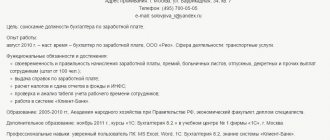What are key skills
Key skills for a resume are a set of knowledge, skills and personal qualities that confirm professionalism in the chosen field of activity. It is necessary to formulate them correctly and indicate them in the right place for a successful job search.
Typically, this will be a separate section in the resume. It contains information that is not included in the description of the functionality, but is critical for the future employer. We are talking about professional skills that are important for performing duties in a specific vacancy. You may not have used them at your last job, but you can use them at the right time. Key skills are divided into groups.
What skills to include on your resume:
- Communication skills: ability to conduct various negotiations, experience in resolving controversial situations, resolving conflicts, handling claims, working with objections, conducting public speaking, ability to persuade, competent written and oral speech.
- Organizational: time management, project management, ability to multitask, strategic planning, working with large amounts of information.
- Leadership: managing people, motivating employees.
- Applied and additional skills in the resume: experienced PC user, office work, knowledge of languages, legislation, ability to work with databases, understand GOSTs, SNiPs, touch typing, proficiency in business correspondence.
Basic writing rules
In order to effectively present your professional skills in a sales resume, use the following rules:
- Write concisely. List 6 to 9 core skills. Giving out too much information will make your resume difficult to read. If too little, then doubts about professionalism will arise.
- Skills must match the requirements of a specific job. Your positioning should immediately make it clear to the HR manager whether he is reading the resume of the performer or the manager.
- Write in a presentable manner. Information should be presented beautifully, powerfully and intelligibly. The more facts and figures, the better. Instead of “extensive sales experience” - “managed a sales department of 10 people for 5 years.”
- Video: How to write a good resume?
https://youtu.be/HVRZdwgO6FU
https://youtu.be/dJRwdfR-dH0
How and in what section to describe them
All knowledge that you indicate in your resume will be carefully considered by the employer. Competently filling out this block lets the employer know that you are the one they need. To do this, you need to formulate personal professional skills for your resume. Often the employer himself indicates what he wants from a future employee. Paraphrase these requirements, be sure to add something of your own, truthful, of course.
What skills and abilities should I write on my resume and in what place? If it’s difficult to come up with it yourself, use the following formulations:
- Business communication skills.
- Organization and planning of working time.
- Attention to detail.
- Stress resistance.
- Flexibility, loyalty.
- Business leadership skills.
These are general resume specific skills suitable for any type of job.
What knowledge and competencies are important for an employer?
The right employee is the one most suitable for the responsibilities assigned to him. And in order to meet your superiors’ idea of a candidacy for your chosen position, you just need to carefully study the vacancy and submit the skills and abilities for your resume that correspond to the requests in the advertisement.
Example of a vacancy for a managerial position:
Your key skills and abilities should quietly repeat the requirements specified by the employer, starting from the responsibilities that will need to be performed. For example like this:
- Ability to organize and optimize the work process.
- Strategic planning skill.
- Knowledge and ability to work with “any” types of documentation.
- Investment capital management skills.
- Skills in creating a flow of clients into new industries.
Expert opinion
Natalia Molchanova
HR manager
In fact, all you need to do to fill out the column is to paraphrase the employer, of course taking into account your own abilities.
Video on the topic:
Writing examples
Let's consider options for what to write in skills on a resume and where it should be done so that the employee is suitable for the position. Let's give an example of skills and abilities for a PR manager resume:
- experience in PR promotion (more than 8 years of work, there are connections in major media);
- knowledge of advertising and promotion on the Internet (experience in developing Internet projects from scratch);
- experience in negotiations and sales skills (more than 8 years);
- high level of PC skills;
- I can explain simply (set tasks, make presentations, teach);
- I speak in public easily.
Of course, correctly formulated specialized knowledge and skills in a resume will help you get the desired position. They reveal the applicant’s professional abilities and goals for further career advancement. Use our table when preparing a self-presentation while looking for a job. Examples of professional skills and knowledge in a resume:
| Leadership skills for managers | |
| Manager |
|
| Manager |
|
| Director |
|
| Head of Sales Department |
|
| Key skills for administrators and secretaries | |
| Administrator |
|
| Secretary |
|
| Key skills and abilities for sellers, consultants | |
| Consultant |
|
| Salesman-cashier |
|
| Key skills and abilities for teachers leading seminars and trainings | |
| Teacher |
|
| Presenter at seminars and trainings |
|
| Key skills and abilities for technical specialists: programmers, system administrators | |
| Programmer |
|
| System Administrator |
|
| Key skills and abilities for accountants, auditors | |
| Accountant |
|
| Auditor |
|
| Key skills and abilities - examples for lawyers | |
| Lawyer |
|
| Key skills and abilities for a resume, example for an HR director | |
| HR Director |
|
| Key skills for drivers | |
| Driver |
|
Do not confuse the description of skills and personal qualities. You should write about responsibility, sociability, punctuality and good appearance in the “About Me” section. And the “Skills and Achievements” section is intended exclusively for business information. It lists all the knowledge and skills. The list should not be very long and detailed; it is recommended to follow the examples and take a few meaningful points. An employer reading a resume sees that the key skills indicated are a consequence of the candidate’s professional work activity, so there is no need to invent something that did not exist.
Examples of skills and abilities for different professions
Below are examples of computer skills and knowledge on a resume, as well as other abilities that are important for workers in various types of business. From them you will learn what can be indicated and what is preferable to remain silent.
Example No. 1: chief accountant
An example of professional accountant skills that can be included in a resume:
- ability to work with several legal entities simultaneously;
- experience in preparing accounting reports;
- ability to keep records;
- conducting monetary transactions;
- knowledge of legislation, especially tax and accounting, as well as labor.
Another example of special skills for an accountant resume is experience in accounting reconstruction. Lost financial information is a very serious violation, and you must be able to resolve this difficult situation.
Example #2: manager
Examples of key skills in a resume for a sales manager:
- management of lower levels of employees;
- experience in attracting new clients or partners;
- ability to increase the percentage of sales;
- ability to conduct business negotiations with potential collaborators;
- knowledge of the analytical aspect of sales and the ability to implement them;
- ability to organize the work of the department for which he is responsible.
Professional skills for a sales manager resume are, of course, not limited to this. But these are the main points that should be presented to a potential boss for consideration.
Example No. 3: seller
Salesperson skills for a resume can be presented as:
- ability to manage your time;
- ability to communicate competently;
- perfect diction;
- creative approach to the sales process;
- customer service skills.
Another example of professional skills in a resume: the ability to persuade, the ability to handle large volumes of information data, having a pleasant voice (oddly enough, this is also important for a sales consultant).
Example No. 4: IT department manager
Special skills for a resume for an IT worker may look like this (description of business qualities):
- experience in personnel management;
- ability to promote and develop the company;
- analysis and active participation in the process of selecting operating systems for further work;
- skills to ensure the normal operation of office equipment.
Example of technical skills that can be described in a resume:
- ability to ensure information security for the entire office;
- management of technical support for other employees of the enterprise;
- reliable protection of confidential data stored on the company’s server;
- creating backup copies, etc.
Computer skills on a potential IT employee's resume are very important. You must provide information about what operating systems you operate: Windows, Linux, etc. The employer must know whether he is dealing with a specialist who can really manage the staff, or with an ordinary employee who is not suitable for a leadership position.
https://youtu.be/HLJ0mYhq-bY
Example No. 5: bank employee
The specific skills that can be described in a banker's resume are very similar to those that we considered for a sales manager. But in this case, an undeniable advantage will be knowledge of at least a conversational level of English. Almost all banks today cooperate with foreign partners, so if you can “connect two words” in English, then you will be guaranteed career growth.
So, what can be included in the resume of a potential bank employee:
- ability to plan time;
- ability to communicate politely with people;
- tendency to persuade even the most intractable clients;
- the ability to find an approach to each client and seek compromises with him;
- the ability to listen and hear the interlocutor.
Of great importance is the tendency to quickly perceive new information regarding the general functioning of the banking sector and innovations. Of course, this trait can be developed over time, but it also needs to be maintained at the appropriate level, since innovations in the banking industry are being developed almost daily.
Do I need to cite specific examples and people?
It is very good if at the end of the resume the contacts of the previous management and their positions are indicated, so that the potential employer or his representative can, if desired, receive feedback, at least one. To do this, you need to contact these people in advance and notify them that they may be called and ask them to briefly describe you as a specialist and just a person. Confirming your own skills for a resume through contacts from your old job is an example of a well-thought-out document. Even if a potential employer does not want to call, then the very fact of having contacts for recommendations will increase his confidence in the applicant and increase the chances of a positive decision.
Types and list of key skills for writing a resume
For convenience, all skills were divided into groups. Let's take a look at them before moving on to the full list of skills:
- Communicative. This includes the skills necessary to negotiate with potential clients, communicate with colleagues, partners, and superiors. The ability to interest a person in your proposal, persuade them to conclude a contract and other diplomatic skills.
- Organizational skills. The ability to plan one’s own and others’ time, distribute one’s own and others’ forces, and manage large complex projects.
- Leadership skills. The ability to lead people and ensure complete compliance with your instructions. Don't overdo it with coldness and harshness. This can scare off the HR manager.
- Analytical skills are one of the most important. It is necessary to generate new ideas and, at the same time, be able to think strategically.
- Applied skills are presented depending on the requirements of a specific vacancy.
See also: How to behave correctly during a job interview so that you are definitely hired. Recommendations and common mistakes
Now let’s take a closer look at these groups and make lists of the skills included in them.
Communication characteristics
List of basic communication skills that can be included in a resume:
- quick resolution of conflicts and disputes;
- holding public events (including public performances);
- conducting business negotiations with partners and potential clients;
- listen and convince people.
It is not necessary to include every item on your resume. Use only those that are true.
It is important to understand the difference between skills and abilities. Skill is the ability to perform an action based on learned experience. A skill is a skill that has been brought to the point of automaticity.
Organizational skills
List of organizer abilities:
- time management;
- conducting large responsible projects;
- distribution and solution of a large number of tasks of different levels of complexity;
- processing large amounts of information;
- strategic thinking and work planning.
A special organizational skill is budgeting. Important for large organizations with large databases of partners and clients. In smaller companies, an employee with this skill will also have an advantage.
Leadership and application abilities
Leadership abilities lie in the ability to manage a team of employees and motivate them to be productive. Applied skills need to be presented as expediently as others. Write only about those that are important for a specific position. Everything that is “out of place” must be excluded.
List of applied skills:
- business correspondence;
- conducting business and personnel proceedings;
- knowledge of foreign languages;
- working with legal documents;
- “touch typing” in Russian and foreign languages.
In addition, indicate computer skills, programs and level of proficiency with them. You cannot promise that you will quickly understand any unfamiliar program. The employer is looking for specific job skills. Show them from the best side and then you will interest him.
How do key skills differ from the personal qualities of an applicant?
The effectiveness of an employee’s work depends not only on the acquired theoretical knowledge and practical experience, but also on his psychophysiological abilities to perform assigned tasks.
Therefore, when writing a resume, you should correctly separate professional advantages from personal characteristics:
- key skills are: to know, to have experience, to have an idea of something, to be able to do something, to own something, to be familiar with something;
- personal qualities are something that is genetically inherent in a person, but can be adjusted in the process of working on oneself: temperament, character, willpower, emotions.
For example, if we are talking about the profession of an accountant. For him, “I work quickly and efficiently with reporting” is a key competency, and “I am meticulous, I have an analytical mind” is a personal parameter.
Why write about professional skills on your resume?
Your skills are a distillation of your experience. You may have several jobs, serious work experience and a description of the experience may take more than one A4 page. This is a large amount of information and the HR manager will have to study it for a long time to understand whether you fit the requirements of the vacancy or not.
Help the HR manager, do this analytical work for him. This will increase your chances of getting an interview.
The main purpose of a skills list is to show that you are a perfect fit for the job requirements. This is exactly the principle I adhere to when writing a “selling” resume.
Examples of other special skills
Among the voluminous flow of applicants for a vacancy, a resume with specified special skills will definitely be remembered by the employer; it will not be sent to waste. But truthful information must be provided there, even if slightly embellished. This speaks to the applicant’s ability to present himself. For senior positions and managers, presentation skills are important.
A candidate who has:
- critical thinking;
- ingenuity;
- ability to make risky decisions;
- adaptive competence;
- integrative (prioritization), conceptual (substantive) abilities;
- interpersonal communicative competence.
What key skills should you indicate if you have no work experience?
How to describe key moments, labor achievements for young specialists after graduating from educational institutions or with an insufficient level of knowledge? It's worth trying the following:
- underwent practical training in this area;
- While studying, he worked part-time in sales;
- learning English remotely;
- I quickly find the information I need;
- I perceive, systematize it, process it, which effectively helps when working with unknown practice;
- able to reorient to new knowledge;
- I speak German well;
- I know how to use a computer, and so on.
Basic professional skills
The main signs of a good resume are presentability and conciseness.
It should list those professional skills that correspond to the vacancy. There is a list of basic characteristics that every modern applicant must have. They are divided into 4 groups. In the first category communicative:
- Negotiation;
- competent written and oral communication;
- resolution of conflicts and controversial situations;
- ability to persuade;
- working with objections and claims;
- ability to speak in public.
The second category is organizational skills. They are important for many jobs. The group includes the following professional knowledge:
- time management;
- budgeting;
- project management;
- strategic planning;
- multitasking;
- processing large amounts of information.
The third category includes leadership traits. List:
- personnel Management;
- motivation;
- generation of ideas;
- analytics.
The fourth group is applied skills necessary for a particular profession. Scroll:
- PC ownership;
- "blind dialing";
- handling office equipment;
- knowledge of the MS Office software package;
- knowledge of GOSTs, SNIPs;
- business correspondence;
- ability to work with legal frameworks, knowledge of legislation;
- office work;
- Foreign language skills;
- personnel production.
- Why do you dream about a baby boy and girl?
- How to treat obsessive-compulsive disorder and fears
- Apple puree: recipes
How to deal with computer skills and language skills
Computer skills in a resume, as well as knowledge of languages, are usually indicated in the “Additional information” section. PC ownership is described as follows:
- Indicate the level of PC proficiency in accordance with the classification: User - Confident user - Advanced user - Programmer.
- List the programs you own. Be sure to indicate program versions. This may be important. For example, you should specify not only 1C, but also version 8.2.
- You can also indicate your level of proficiency in office equipment if this skill is important for the job for which you are applying.
As for languages, if they are needed, indicate them in the “Language - Proficiency Level” format. For English it is Elementary, Pre-Intermediate, Intermediate, Upper-Intermediate, Advanced or Fluent.
How to find out what an employer wants
The main points when writing a resume should be:
- the reality of the specified information;
- relevance of the applicant’s competencies to the type of activity of the organization.
Companies often select employees based on “three pillars”:
- the candidate must be successful;
- be able to make decisions;
- work in a team.
To find out the needs of a particular employer, thereby increasing the likelihood of getting a position, it is worth collecting as much information as possible about the company via the Internet, a circle of acquaintances, and subsequently focusing in your resume on personal and professional qualities, starting from:
- type of activity of the company;
- its position in the market;
- states of success.
Next, consider what the employer wants:
- collaborate with pleasant people whose first impression of their appearance is formed from the photo in their resume;
- work only with competent employees who can express their thoughts and present information correctly;
- see a logical career path;
- observe the presence of recommenders, which indicates that the applicant is not afraid to indicate them;
- he does not want to read the experience reflected in one sentence, to unravel the abbreviations of unknown names.
The resume should reflect the answers to the queries put forward in the vacancy announcement.
What to write in skills for a resume
- The skills in your resume should accurately and succinctly represent you as a specialist. That is, it is better to indicate more specifically what technologies or programs you work with, rather than generalize.
- As mentioned above, adapt your list of skills in your resume to the desired position, and do not just list everything you can and know. It is better to choose 5-7 basic skills.
- At the same time, do not blindly copy phrases from the text of the vacancy. Write “from yourself”, based on personal experience. Your real knowledge will still come up during the interview process or directly during work, so write in your resume about what you actually know, and in your own words.
Please note: if you are a beginner specialist, it is the “Key Skills” section that can “save” your resume and convince the employer of your competence. Therefore, pay special attention to it.
In general, the skills on a resume can be as follows:
- Expert knowledge in your professional field.
- Knowledge of legislation.
- Knowledge of special programs.
- Understanding the specifics of your industry, knowing the main players.
- Team management.










